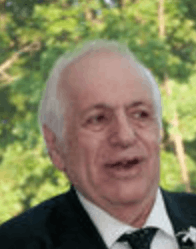S. M. Blinder
Seymour Michael Blinder (born March 11, 1932 in New York City) is a professor emeritus of chemistry and physics at the University of Michigan, Ann Arbor and a telecommuting senior scientist with Wolfram Research in Champaign, Illinois.

Personal
He attended Cornell University and received an A.B. in physics and chemistry in 1953. He received an A.M. in physics in 1955 and a Ph.D. in chemical physics in 1958 from Harvard University under Professors W. E. Moffitt and J. H. van Vleck (Nobel Laureate in Physics 1977).
Academic positions
- Johns Hopkins University, Applied Physics Laboratory, senior physicist, 1958–1961
- Carnegie Institute of Technology (now Carnegie-Mellon University), assistant professor, 1961–1962
- Harvard University, visiting professor, 1962–1963
- Visiting research fellow, University College London, 1965–1966
- Visiting research fellow, Centre de Méchanique Ondulatoire Appliquée, Paris, 1970
- Visiting research fellow, Mathematical Institute, Oxford, 1971
- University of Michigan, professor, 1963–1995
- University of Michigan, professor emeritus 1996–present
- Wolfram Research Inc., senior scientist 2007-present
Honors and awards
Blinder has received the following awards and honors:
- Phi Beta Kappa, 1953
- National Science Foundation Predoctoral Fellowships, 1953–1955
- Guggenheim Fellowship, 1965–1966
- National Science Foundation Senior Postdoctoral Fellowship, 1970–1971
- Rackham Research Fellowships, University of Michigan, 1966 and 1977
Interests
Research interests include: Theoretical Chemistry, Mathematical Physics, applications of quantum mechanics to atomic and molecular structure, theory and applications of Coulomb Propagators, structure and self-energy of the electron, supersymmetric quantum field theory, quantum computers.
During his academic career, S M taught a multitude of courses in graduate level Quantum Mechanics, Statistical Mechanics, Thermodynamics, Electromagnetic Theory, Relativity, and Mathematical Physics.
Personal interests include: Playing cello, classical music, and chess (S M is a former Junior Chess Master).
Books and publications
Blinder has authored over 200 journal articles in theoretical chemistry and mathematical physics. He has also published four books:
- Advanced Physical Chemistry; A Survey of Modern Theoretical Principles (Macmillan, New York, 1969)
- Foundations of Quantum Dynamics (Academic Press, London, 1974)
- Quantum Mechanics in Chemistry, Materials Science, and Biology (Elsevier Academic Press, 2004)
- Guide to Essential Math: For Students in Physics, Chemistry, and Engineering (Elsevier Academic Press, 2008); 2nd Edition 2013